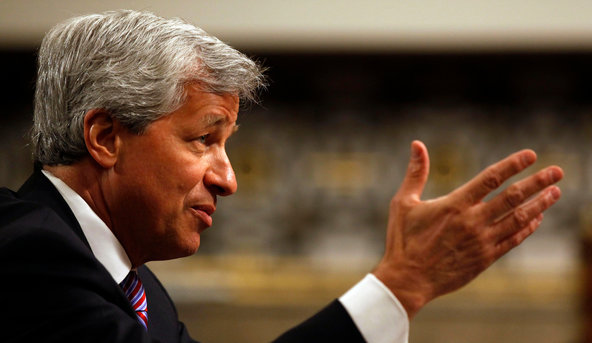 Larry Downing/ReutersJPMorgan Chase shareholders will vote on whether Jamie Dimon should be chairman and chief.
Larry Downing/ReutersJPMorgan Chase shareholders will vote on whether Jamie Dimon should be chairman and chief.
“This isn’t about good governance; it’s about busybodies without a clue, trying to do the dumbest thing — slapping and shaming a superb C.E.O. for utterly no practical reason.”
That’s what Barry Diller, the media mogul, told me on Monday about the possibility that shareholders could vote to strip Jamie Dimon, the chairman and chief executive of JPMorgan Chase, of his chairman role.
DealBook Column
View all posts
Mr. Diller’s colorful bluntness adds some much-needed sanity to all the hyperventilating pundits and corporate governance hysteria about the fate of Mr. Dimon in recent days. (Incidentally, Mr. Diller expressed this view even though his company, IAC/InterActiveCorp, has split the chairman and chief executive roles.)
Next Tuesday, Mr. Dimon will face a nonbinding shareholder vote about whether the roles of chairman and chief executive at JPMorgan should be split. The vote may not sound like a big deal. If he loses, he would remain the C.E.O., and technically, he could remain the chairman since the vote is nonbinding. But the question before shareholders has moved beyond simply a philosophical debate about whether corporations should have a separate chairman and chief executive.
The vote increasingly appears to have become a referendum on Mr. Dimon personally.
In truth, the machinations around the vote at JPMorgan have an “Alice in Wonderland” quality. Call it “Jamie at the Mad Hatter’s Tea Party: The Tempest in a Teapot Edition.”
JPMorgan’s Trading Loss
While Mr. Dimon has made his share of mistakes — among them the “London Whale” scandal that has cost the bank billions and a series of regulatory blunders — they have not crippled the bank, despite making great headlines. It may not be popular to say, but the incontrovertible fact remains that JPMorgan is still one of the best-performing banks on Wall Street under Mr. Dimon. The firm is possibly the only major bank in the nation that did not require a bailout. It hasn’t lost money in any single quarter while Mr. Dimon has been at the helm. And it has outperformed most of the Standard Poor’s 500-stock index as well as many of its peer banks over the last five years.
Worse, the frenzy over splitting chairman and chief executive at JPMorgan misses a crucial and fundamental point: the person that would most likely become the chairman, Lee Raymond, is already the board’s “lead director” and already performs virtually the same duties that he would with the chairman title.
So the debate has seemingly become about semantics. Should Mr. Raymond, currently the lead director, hold the title of chairman? If you didn’t think there was enough accountability and adult supervision with him in that role, it’s hard to believe you will think there will be if he becomes chairman. Of course, the board could bring in an outside chairman, but that adds its own series of complications.
Even Ira Millstein, one of the fathers of the corporate governance movement, told me that while he preferred a separation of powers, his view had evolved. “Because of the evolution of a broad consensus on the need for strong board leadership, I now believe that one size may not necessarily fit all. A strong lead director with the same duties as a chair might serve the purpose,” said Mr. Millstein, chairman for the Center for Global Markets and Corporate Ownership at Columbia Law School and a partner at Weil, Gotshal Manges.
The knee-jerk response, including my own, to good governance is to separate the roles of chairman and chief executive. It just sounds as if it is more accountable to shareholders.
But the evidence that splitting the chairman and C.E.O. roles has a positive impact on performance is thin. A number of studies have tried to quantify the impact, but ultimately the debate has far from concluded.
In Europe, for example, most public companies have split the roles of chairman and chief. But then consider the financial crisis: virtually every big high-street bank in Britain required a bailout despite the corporate governance structure. Remember Enron? It had a split structure.
Take a look at Fortune’s 50 most admired companies list. Only four companies have split the role.
I also spoke with Henry M. Paulson Jr., the former Treasury secretary and former chairman and chief executive of Goldman Sachs, about the debate over Mr. Dimon’s role. In theory, Mr. Paulson said that he was not opposed to splitting the roles of chairman and chief executive in certain circumstances generally, but in this case believes it would be the wrong decision.
“Jamie Dimon saw JPMorgan through the worst financial crisis in a generation, and now through this period of great regulatory change,” Mr. Paulson said. “To me, in periods of great change, continuity of the leadership team and structure, especially under his strong leadership, is the best path. A change in structure is unwarranted, and could be counterproductive.”
The greatest immediate risk to JPMorgan is change: the possibility that Mr. Dimon decides to take his ball and go home. Mr. Diller said such a decision would be “petulant.” But it is also hard to believe that Mr. Dimon would want to continue running the firm for many years if he receives the equivalent of a no-confidence vote. Plus, there is no clear successor waiting in the wings. (That is something the bank should make a priority.)
So while the separation of two roles might be right in a perfect world, the reality is more complicated.
Article source: http://dealbook.nytimes.com/2013/05/13/making-a-case-for-one-leader-at-jpmorgan/?partner=rss&emc=rss



